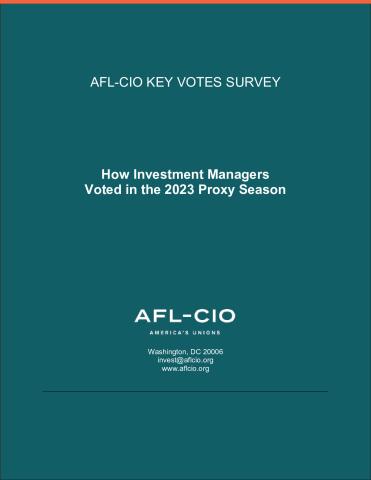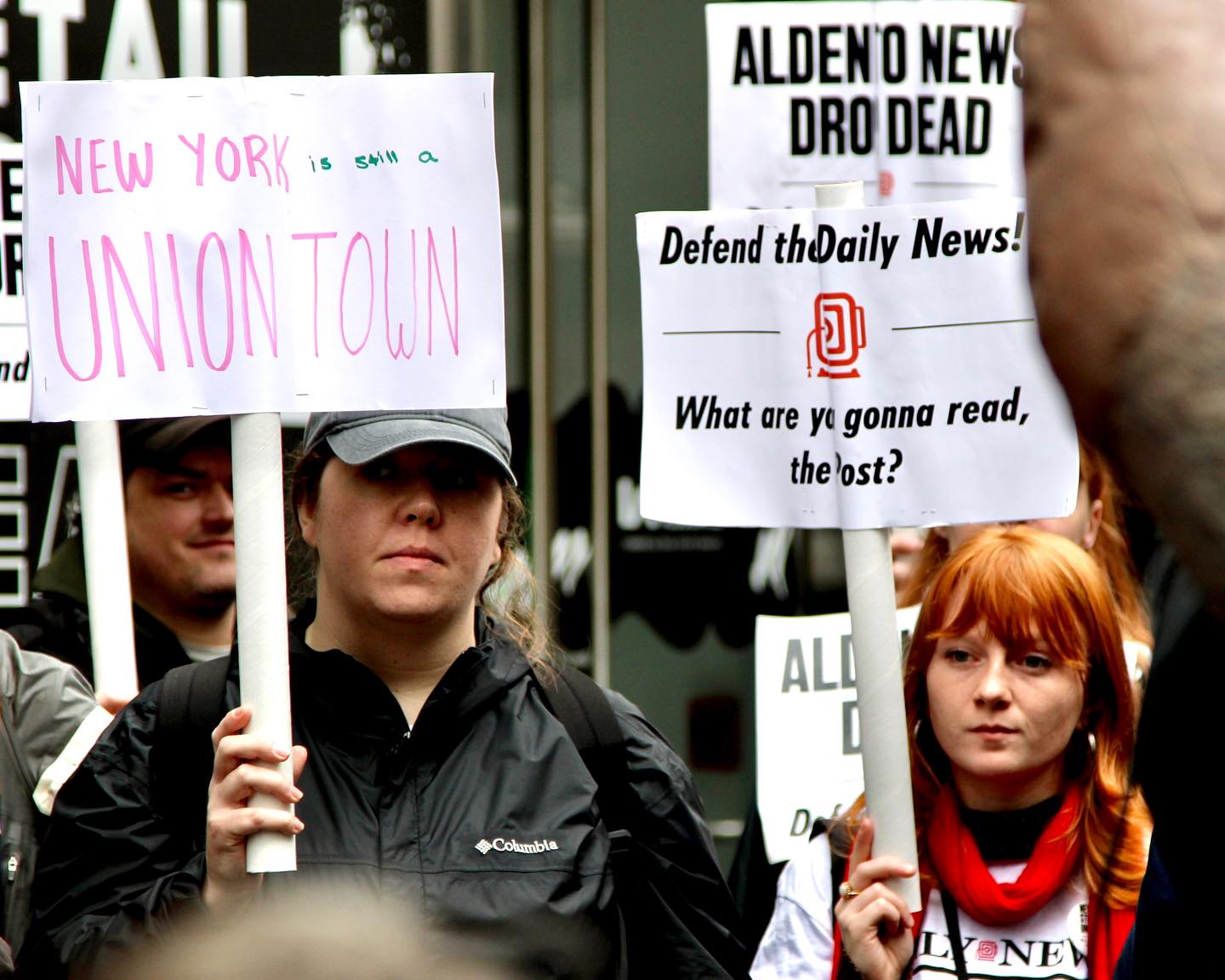Good afternoon. I’m Richard Trumka, President of the AFL-CIO.
In a moment, Congresswoman Maxine Waters, Ranking Member of the House Committee on Financial Services, will give her keynote address, which is a perfect capstone to today’s conference. First, though, I want to offer a few remarks on the significance of today’s discussion.
First, I want to acknowledge the work of our Policy Department, and in particular our macroeconomist Tom Palley, for organizing this conference, not once, but twice, as the first attempt was snowed out. I also hope you will join me in thanking our staff in the Policy and Facility Management departments who have made this event run so well.
I also want to thank this morning’s speakers, who gave excellent presentations on the issues we face. We heard about the economic importance of the exchange rate and what it means for monetary policy. We listened to a thoughtful analysis of challenges posed by our Jekyll-and-Hyde economy, in which job growth has been strong while wage growth has been terrible. And we are all concerned that financial instability remains a threat to all working families.
The theme of this conference could not be more timely. Today, the Federal Reserve’s Open Market Committee began a two-day meeting to consider raising the short-term interest rate. Later this month, Federal Reserve Chairwoman Janet Yellen will provide her semi-annual report to the Senate Committee on Banking, Housing and Urban Affairs and the House Committee on Financial Services.
The actions taken by the Federal Reserve and these important Congressional committees will have a tremendous impact on jobs and wages.
That’s not all. The Trans-Pacific Partnership is still looming. Later this month we will do a full day event addressing the challenges posed by our corporate dominated trade policy. But we can’t wait—the challenges facing monetary policy and the impact of currency manipulation are so significant I want to address them right now. And as we all know, the TPP simply fails to address this unfair trade practice, potentially locking the U.S. into a massive trading system that has devastated our manufacturing base.
For these reasons and more, I hope the ideas presented and discussed here will shape the outcomes of those vital policy deliberations.
I would like now to address these two points, wages and currency manipulation, in more detail.
As we all know, eight years ago, as a result of decades of bad public policy and Wall Street greed, America suffered a financial crisis that shook the foundations of the entire global economy. At the peak of the crash in late 2008, there were fears the world was on the verge of a second Great Depression.
Fortunately, President Obama and a Democratic Congress took immediate and necessary action to stop the collapse in the form of the American Recovery and Reinvestment Act.
Yet as soon as the crisis had receded from a catastrophic level, too many people downplayed its seriousness, arguing it had merely been caused by a financial shock that triggered an unusually deep recession, and that a bit of financial reform and a small dose of stimulus was all that was needed.
So as unemployment rose, and wages fell, Policymakers abandoned the sensible fiscal policies of public investment and embraced the mistaken idea that austerity—cutting government spending and public employment—was the right medicine for economies suffering from slow growth, mass unemployment and recession-driven budget deficits.
To its credit, the Federal Reserve was critical of this shift to austerity. Then Vice Chair of the Federal Reserve Janet Yellen spoke in detail here at the AFL-CIO in February 2013 warning that the fiscal tailwind of stimulus had given way to a stiff headwind of austerity. And she noted the premature nature of this policy reversal compared to previous recessions.
The Federal Reserve also deserves credit for rejecting the counsel of those who argued against lowering interest rates during the crisis; and who later wanted to prematurely raise interest rates to prevent what some said would be inevitable inflation. Thanks to the Fed, interest rates stayed low, and inflation hasn’t been a problem.
The policy battles over austerity illustrate the significance of economic policy for shared prosperity and full employment. This is why the AFL-CIO organized today’s conference.
America remains tangled in a basic debate, although we seldom tackle it head on. I’m talking about how to create shared prosperity, which is the ultimate focus of today’s conference. It’s a debate the Federal Reserve Bank must weigh in on, and do so on the right side. That means fundamentally rethinking how the Fed looks at wages.
The American economy was broken long before 2008, and it remains fundamentally out of balance today. We know the problem all too well; how workers bargaining power has eroded, causing pay to languish even as productivity rises. The result is our society has become more and more unequal, and America’s working families have suffered and continue to suffer.
The Federal Reserve is implicated in this tragic history. While the Fed has pursued admirable policies during times of “crisis” for which it should be commended, in “non-crisis” moments prior to 2008, the Fed failed to do its part to create an economy with rising wages.
By accepting the fictional notion of a natural rate of unemployment, and the idea that monetary policy cannot permanently lower unemployment, the Fed devalued the concept of full employ-ment. In doing so, it lowered the importance of jobs and wages in the national economic conversation.
Side-by-side, the Fed facilitated and gave credibility to the economic model that placed credit and asset price inflation above wage growth as the engine of demand. This model set the stage for accelerated inequality in America and helped to ultimately destabilize our economy.
Because of the leadership of President Obama and leaders like Congresswoman Waters, we escaped a second Great Depression. But we have a lot more work to do. We must change the economic model so that it again delivers for working families.
The Fed cannot just put out financial fires. It needs to take more seriously its mandate to pursue full employment—the critical ingredient of shared prosperity. Otherwise, the American economy will remain dangerously out-of-balance, at risk of stagnation and vulnerable to another financial collapse. How do we know when we reach full employment? At a minimum, when wages rise with productivity in a sustained way.
Monetary policy can and must promote shared prosperity, and it will, if the tools and policy frameworks discussed today are adopted.
Now I want to talk specifically about trade, exchange rates and Federal Reserve monetary policy.
The Treasury Department decides exchange rates, and Congress and the White House are responsible for trade agreements. This much is true. But all of these issues have a profound effect on the Federal Reserve and our entire economy.
In fact, right now, manufacturing is again suffering from a strong dollar. This is a predictable problem. We’ve been here before. It’s time for a fix.
For too long, the Treasury’s formal responsibility for the exchange rate has been used as an excuse to avoid a full and open dialogue about these vital issues. Exchange rates should get significant attention and public discussion from the Federal Reserve. Because it is literally impossible to make monetary policy in the public interest without being able to have an open discussion of the impact of currency manipulation.
That discussion has to include trade agreements. The truth is, the TPP’s complete failure to address exchange rates or provide a remedy for currency manipulation are major problems that remain unaddressed.
Let me close by connecting the dots between policy and policymakers. Policy does not happen in a vacuum. It is made by people.
We should all be concerned about the inappropriate influence of commercial banks on the Federal Reserve, especially the district Federal Reserve banks. The influence comes from the ownership stakes commercial banks have in the Fed.
In addition, we should also all be concerned about the lack of diversity in representation within the Federal Reserve governance hierarchy.
The undue influence of banks and lack of diversity help tilt Federal Reserve policy away from the pursuit of shared prosperity, and toward the economic model that has promoted wage stagnation, income inequality, trade deficits and manufacturing job loss.
Policy is made by people, and there are few better than Congresswoman Maxine Waters, who has been a champion for shared prosperity and has long spoken out on the importance of building a fairer economy.
Congresswoman Waters has represented California's 43rd Congressional District for 23 years, and she serves as the Ranking Member of the House Financial Services Committee, which is responsible for oversight of the Federal Reserve. Her fearless hand has been felt on every piece of positive legislation I can remember, and America is better off for it.
The AFL-CIO is deeply honored by her willingness to address today’s conference. Please join me in a warm welcome for my sister and friend, Congresswoman Maxine Waters!



